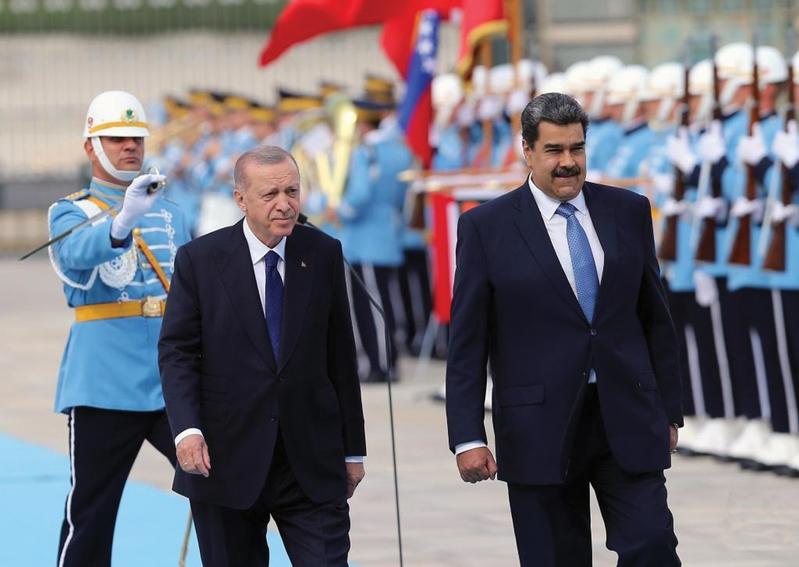 Turkish President Recep Tayyip Erdogan (left, front) welcomes his Venezuelan counterpart Nicolas Maduro (right, front) at an official ceremony in Ankara, Turkey, on June 8. The two leaders pledged to enhance cooperation between their countries. (MUSTAFA KAYA / XINHUA)
Turkish President Recep Tayyip Erdogan (left, front) welcomes his Venezuelan counterpart Nicolas Maduro (right, front) at an official ceremony in Ankara, Turkey, on June 8. The two leaders pledged to enhance cooperation between their countries. (MUSTAFA KAYA / XINHUA)
ANKARA — Turkey gave visiting Venezuelan President Nicolas Maduro a warm welcome while the United States barred him from the Summit of the Americas in Los Angeles.
At a joint press conference with Maduro in Turkish capital Ankara on June 8 after their official meeting, Turkish President Recep Tayyip Erdogan pledged to enhance cooperation between the two countries.
“There is a wide cooperation potential between Venezuela and Turkey, especially in trade, energy, mining, construction business, health, agriculture and tourism,” Erdogan said.
Speaking of a memorandum of understanding signed on June 8, Erdogan said this has strengthened “the legal infrastructure” of the Turkish-Venezuelan relations.
Calling Venezuela “a friendly country”, the Turkish president said he “opposes sanctions against Venezuela” and that Turkey will stand by the country “from now onward”.
Maduro, for his part, expressed gratitude to Turkey on behalf of his people.
“In times of greatest uncertainty, in the most difficult moments and at the time of the pandemic, Turkey has been always by our side and supportive of us,” the Venezuelan president said.
Maduro arrived in Turkey on June 7 for an official visit as poor attendance of regional countries in Latin America clouds a summit in Los Angeles.
Venezuela, Nicaragua and Cuba were not invited to the Summit of the Americas hosted by Washington from June 6 to 10.
Leaders of El Salvador, Guatemala and Honduras were also absent at the US event, even though illegal migration from the region is expected to be a key talking point.
In Caracas, people spoke out at “anti-imperialist forums” to voice their opposition to select countries being excluded from this week’s Summit of the Americas.
“It’s everyone or it’s not of the Americas,” Pedro Infante, a legislator from the ruling United Socialist Party of Venezuela, said at a forum on June 8.
Carlos Casanueva of the Bolivarian Continental Movement, a civic organization, said the forums have been organized since June 6 at public plazas around the country, “mainly in repudiation” of the exclusion.
Carleslia Ascanio, who attended a forum in Caracas, said the anti-imperialist forums offered the public a space for debate and “battle of ideas.”
Participants have said the Summit of the Americas should not be for one country’s benefit, noting that the US is placing its own interests above the common interests of the region.
In a statement issued June 6, the Cuban government said that there is no single reason to justify the US government’s “undemocratic and arbitrary exclusion” of any country of the hemisphere from the 9th Summit of the Americas.
Washington, abusing its privilege of being the host country, decided at a very early stage to exclude Cuba, Venezuela and Nicaragua from the summit, and used pressure, threats and blackmail against governments in the region, it said.
“Our region demands cooperation, not exclusion; solidarity, not meanness; respect, not arrogance; sovereignty and self-determination, not subordination,” it added.
At a press conference on June 7 prior to his departure for Los Angeles, Mexican Foreign Affairs Minister Marcelo Ebrard said his country will press for an end to the “inhumane” decades-old US trade embargo against Cuba, during the summit.
Ebrard said lifting the web of sanctions, which Cuba describes as a financial, economic and trade blockade, stands to be the central theme of the summit.
“We will insist that the blockade is inhumane ... ineffective and has been condemned by all the countries that are going to be at the summit,” Ebrard said.
“No country has the right to tell another how to govern itself. The foundation for a new stage in the Americas is mutual respect. It is what we are championing and will champion,” he added.
Mexico “has never agreed” with the blockade or the US policy towards the Caribbean island following the 1959 Cuban Revolution, he said.


